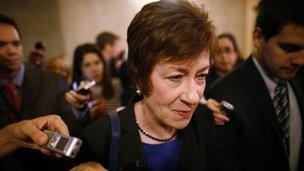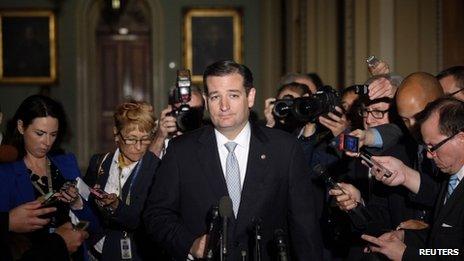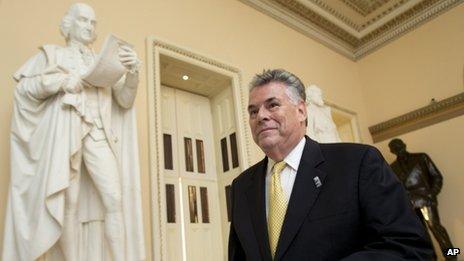How to rebuild the Republican brand
- Published
The Republican Party drew its lowest approval ratings in history during the US government shutdown and debt ceiling impasse. Political strategists offer five recommendations for how to rebuild the party's brand.
1. Move on from Ronald Reagan

Ronald Reagan last stood for election in 1984, 11 years before the birth of the youngest voters in the upcoming November poll
Republican strategist Ford O'Connell notes the party cites popular two-term US President Ronald Reagan, in office 1981-89, on an array of issues.
But more than two decades after Reagan left office, the late president is not doing the party any favours, he says.
"Ronald Reagan is dead and they need to accept it," says O'Connell.
O'Connell suggests that instead of inspiring positive associations in voters' minds, invoking Reagan actually "prevents modern Republicans from articulating a 21st Century agenda".
Republican strategist Tom Rath says Reagan, an "icon" of the party, would not be the same figure today as when he was president in the 1980s.
"His presidency was a presidency for the times, and times change," he says. "Ronald Reagan didn't have to deal with Twitter or the internet; things are different now."
"To say we have to do exactly what Reagan did, that belies the inevitable change in the character of the American people and the issues that are on the table."
And Republican strategist John Feehery says, "He was conservative, but he's not nearly as conservative as these guys [in Congress] now."
2. Get yourself an Angela Merkel

The Republicans need a powerful female figure to draw in women voters who have abandoned the party
"We need someone who can be tough but also exhibit common sense and be practical," says Feehery, who cites the current chancellor of Germany.
Feehery says the Republican Party lacks a strong cadre of women, and one woman in particular who can assume a senior role in the current "patriarchal" congressional leadership.
Republicans need a "Sarah Palin with brains," jokes Feehery of the former Republican vice-presidential candidate, who later resigned as governor of Alaska for a career as a professional conservative figurehead and speechmaker.

Collins is seen as one of the more centrist members of the very conservative Republican caucus
The Republican strategist says women in Congress helped soothe tensions behind the scenes during the 16-day government shutdown and debt limit deadlock.
Republican Senator Susan Collins in particular has been recognised for her role in facilitating successful negotiations between Senate leaders of both parties.
"If there is anything to be heartened by over the last few weeks, it is the emergence of Susan Collins," Rath says.
Collins and other women Republican senators "found a way to get to [an ideological] middle and at least stop the train wreck from happening," he added.
3. Embrace - or at least ignore - gay marriage

Support for same-sex marriage has grown considerably in recent years
As more US states legalise same-sex marriage, Republicans can no longer remain so staunchly opposed to it, O'Connell argues.
Gay marriage is growing in popularity nationally, he says, and Republicans must recognise their fierce opposition hurts them with younger voters.
"There is a large recognition that among right-leaning independents and Republicans under 40 that it's a fact of life and it's here to stay," he says.
Feehery says Republicans are not yet ready to embrace same-sex marriage, but leaving opposition to it out of the party message could prove successful over the long term.
"I think we'd be better off not talking about it," he says.
4. Accomplish something - anything

Republican Senator Ted Cruz was one of the most vocal architects of the government shutdown
Republicans have taken the blame for shutting down the government in an attempt to defund President Barack Obama's signature healthcare reform law, known as Obamacare.
But Republican strategists argue that Republicans must move beyond just denigrating Democratic proposals if they want to improve their brand among voters.
"You win more elections by saying what you're for than what you're against," says Rath.
Feehery asks, "What is their governing philosophy other than tearing stuff down? How do you build stuff up and does the party want you to build stuff up?"
Complicating the matter, the party base "doesn't have any trust in government", Feehery says.
"There's a big mood amongst the Tea Party... and conservative Republicans that they don't want accomplishments," Feehery says. "They don't want government to get bigger, they don't want new laws, they don't want anything.
"Unless you're talking about getting rid of Obamacare or repealing some other laws, they don't want to talk to you. And that's problematic because their job as legislators is to pass laws and get things done."
Feehery advises the party to focus on immigration reform, a budget deal, and reforms of the food aid programme, for example.
"Try to get stuff done," he says.
5. Watch your language

Republican Congressman Peter King publicly questioned his party's strategy during the government shutdown and debt ceiling impasse
The partial government shutdown made it clear the Republican Party has been cleaved into two factions, so-called moderate establishment Republicans and more strident Tea Party Republicans pushing for confrontation.
More moderate figures were seen on talk shows lambasting their more right-wing brethren, while Tea Party members threatened intra-party challenges against those in Congress they viewed as not toeing the party line.
"They have to improve their communication strategy," O'Connell says.
"Most Americans don't know a heck of a lot about policy or where either of the parties stands, but what they do know is tone and language, and if Republicans don't take a more appealing moderate tone and use less fire-and-brimstone rhetoric, they're never going to expand the tent of voters."
The Republican strategist also argues that the party must move beyond the Washington lexicon in order to appeal to those outside the political bubble.
"They have to do a better job of a sales pitch and they also have to better explain their positions," O'Connell claims. "They assume people know things about different budget issues or what's going on, and they really don't."
He says former Republican President George W Bush connected with the public on a folksy level, and others in his party should take note.
So, party leaders should dispense with all the budget talk with appearances on late-night comedy programmes.
"You're not a hack by watching your words," O'Connell says. "That doesn't mean compromise your principles, it's just that so much more can be accomplished through perception than in actual policy positions."
"The Republicans will know they've hit the right balance when people want to have a beer with them, and right now they don't."